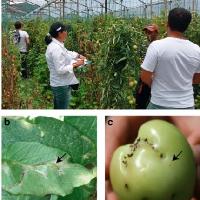Resumen
-
Decision-making for pest management in agriculture can be assisted by sampling plans that guide users in determining the need for an intervention. The tomato leafminer, Tuta absoluta, is easily recognizable by most tomato growers and several sampling plans have been developed. Yet, the adoption of decision-making systems for this pest is still incipient. Market uncertainty and farmers’ risk aversion are two potential obstacles that could be tackled by sampling plans that allow for the scheduling of interventions according to rough estimates of economic thresholds and to farmers’ intuition and experience. In this study, we used computer simulations and greenhouse trials to compare the efficiencies of four sampling plans both to estimate the mean number of larvae per plant and to classify pest populations according to a predefined economic threshold. We also analyzed the time spent and the number of plants examined by volunteers when applying each plan on a leafminer-infested tomato crop slightly over a predefined economic threshold. We show here that sampling plans giving the most precise classifications are not necessarily those yielding accurate pest density estimations. While computer simulations showed that the best plans for classification are those for estimation, results with humans evidenced the opposite. However, the average number of samples required by sampling plans does not reflect the time spent by humans sampling real plants. Our results show, for the first time, that sampling plans based on counts rather than on binary data can provide reliable information on the current level of a T. absoluta infestation relative to a decision threshold. We suggest that sampling plans promoting the creation of farmers’ memory, such as those based on counts, may be more suitable both to reduce risk aversion and to increase adaptability to market uncertainty.
